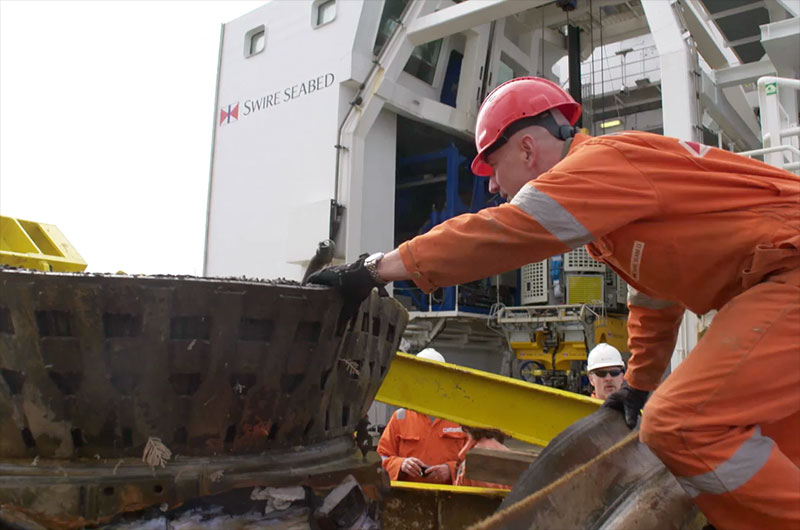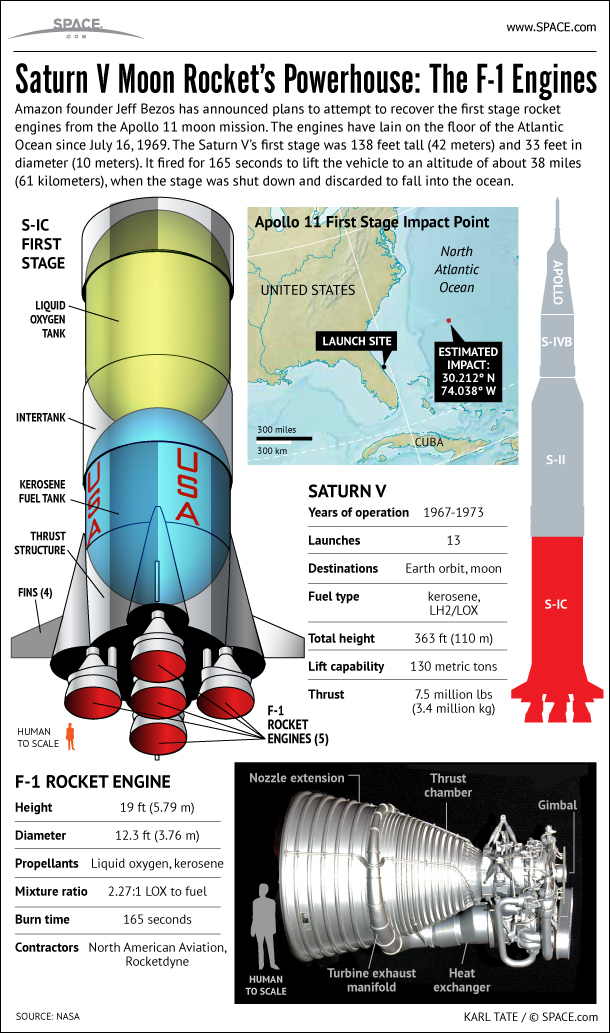Amazon CEO's Moon Rocket Engine Recovery Team Honored by Explorers Club

The private expedition that successfully recovered historic NASA moon rocket engines from the ocean floor was honored in New York City on Saturday (March 15) by a venerable group of explorers, including an astronaut who rode to space atop those very same engines.
The Apollo F-1 Engine Search and Recovery Team, as led by Amazon.com founder and chief executive Jeff Bezos, received the Citation of Merit from The Explorers Club, a professional society that promotes scientific exploration of the land, sea, air and space. The award was presented to Bezos by the club's president Alan Nichols and Apollo 11 astronaut Buzz Aldrin, who in 1969 joined Neil Armstrong to become the first men to walk on the moon.
"We were delighted and honored that Buzz Aldrin made the trip to present the award himself," Bezos wrote on his expedition's website on Sunday. "It's a big honor and well-deserved by a truly remarkable group of explorers." [Video: Apollo F-1 Engine Expedition]

Financed by Bezos Expeditions, the F-1 Engine Recovery Project was launched in secret in 2011. In March 2012, Bezos announced to the world that he had located the F-1 engines on the seafloor, and, almost exactly a year later, revealed they had recovered the parts for at least two full enginesfrom a depth of over 14,000 feet (4,270 meters).
"It is hard to find something [that is] more profound as an engineered object than an F-1 engine," Bezos said in a 10-minute video that premiered at The Explorers Club's 110th annual dinner. "[It was the] most powerful, single-chamber rocket engine ever designed and manufactured. Sixty-five of these engines flew and there were zero failures."
Five of the 18.5-foot (5.6-m) tall engines powered the first stage of NASA's Saturn V rocket, the mighty booster that launched astronauts to the moon and deployed the United States' first space station, Skylab. When the rocket's first stage burned through its fuel supply, it was jettisoned and allowed to drop into the Atlantic Ocean. [See photos of Bezos' Apollo Rocket Engine Recovery]
The force of the impact with the water and ensuing plunge to the ocean's floor ripped apart the stage and its engines, leaving them almost unrecognizable.
Get the Space.com Newsletter
Breaking space news, the latest updates on rocket launches, skywatching events and more!
"The search and recovery effort took years of work," wrote Bezos on the expedition's website. "All along the way, this team worked long, hard and smart, and we had a ton of fun. Thanks to the team, soon a whole new generation of young people will be able to see these amazing engines on display."
The more than 25,000 lbs. (11,340 kg) of engine parts that Bezos' team recovered were delivered in March 2013 to the Kansas Cosmosphere and Space Center, where a multi-year conservation effort is underway to preserve the F-1 artifacts for their display. In the course of their work, the conservators were able to identify at least one of the parts, a thrust chamber, had helped launch Apollo 11, the first manned lunar landing mission, in July 1969.
"Apollo 11, I was five years old and it really was a seminal moment for me. I remember watching it on our living room TV," Bezos recalled. "That definitely became a passion of mine."
Though Bezos financed their recovery, the engines remain federal property. NASA Administrator Charles Bolden has said the space agency plans to work with Bezos to place the preserved engine parts on public display.
The venues for those exhibits has yet to be announced, but Bolden and Bezos have mentioned the Smithsonian's National Air and Space Museum in Washington, D.C. and Seattle's Museum of Flight, located near Bezos' Amazon offices, as potential recipients.
"If this [exhibit] results in one young explorer, one young adventurer doing something amazing that helps the world, I'm totally fulfilled," Bezos stated. "Maybe they'll build the next F-1."
Click through to collectSPACE.com to watch Bezos Expeditions' video presented at The Explorers Club’s 110th Annual Dinner.
Follow collectSPACE.com on Facebook and on Twitter at @collectSPACE. Copyright 2014 collectSPACE.com. All rights reserved.
Join our Space Forums to keep talking space on the latest missions, night sky and more! And if you have a news tip, correction or comment, let us know at: community@space.com.

Robert Pearlman is a space historian, journalist and the founder and editor of collectSPACE.com, a daily news publication and community devoted to space history with a particular focus on how and where space exploration intersects with pop culture. Pearlman is also a contributing writer for Space.com and co-author of "Space Stations: The Art, Science, and Reality of Working in Space” published by Smithsonian Books in 2018.In 2009, he was inducted into the U.S. Space Camp Hall of Fame in Huntsville, Alabama. In 2021, he was honored by the American Astronautical Society with the Ordway Award for Sustained Excellence in Spaceflight History. In 2023, the National Space Club Florida Committee recognized Pearlman with the Kolcum News and Communications Award for excellence in telling the space story along the Space Coast and throughout the world.










